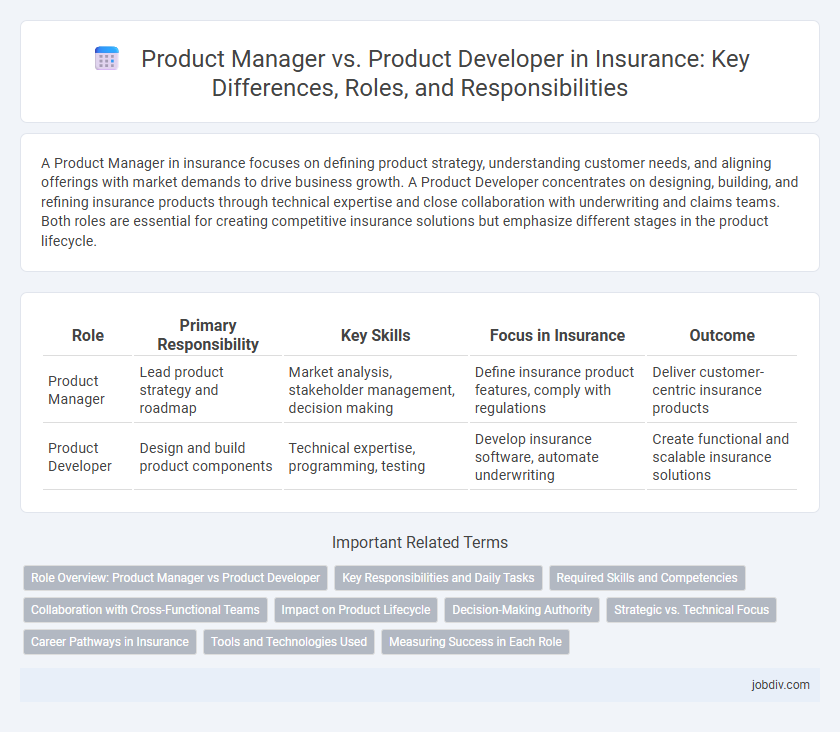A Product Manager in insurance focuses on defining product strategy, understanding customer needs, and aligning offerings with market demands to drive business growth. A Product Developer concentrates on designing, building, and refining insurance products through technical expertise and close collaboration with underwriting and claims teams. Both roles are essential for creating competitive insurance solutions but emphasize different stages in the product lifecycle.
Table of Comparison
| Role | Primary Responsibility | Key Skills | Focus in Insurance | Outcome |
|---|---|---|---|---|
| Product Manager | Lead product strategy and roadmap | Market analysis, stakeholder management, decision making | Define insurance product features, comply with regulations | Deliver customer-centric insurance products |
| Product Developer | Design and build product components | Technical expertise, programming, testing | Develop insurance software, automate underwriting | Create functional and scalable insurance solutions |
Role Overview: Product Manager vs Product Developer
The Product Manager in insurance oversees the entire product lifecycle, guiding strategy, market analysis, and cross-functional collaboration to ensure products meet customer needs and regulatory requirements. The Product Developer focuses on the technical design, development, and testing of insurance products, ensuring features align with specifications and compliance standards. Together, they drive innovation and efficiency, with the Product Manager steering vision and market fit while the Product Developer executes practical implementation.
Key Responsibilities and Daily Tasks
Product Managers in insurance focus on defining product strategy, conducting market research, and aligning product features with customer needs to maximize profitability. Product Developers handle the technical implementation, pricing models, regulatory compliance documentation, and coordinate with actuaries and underwriters to ensure product feasibility. Both roles require collaboration with sales and claims teams, but Product Managers prioritize strategic oversight while Product Developers concentrate on execution and detail management.
Required Skills and Competencies
Product Managers in insurance require strong strategic thinking, market analysis, customer insight, and cross-functional leadership skills to define product vision and drive business growth. Product Developers focus on technical expertise, insurance regulations, risk assessment, and agile development methodologies to design, test, and improve insurance products efficiently. Both roles demand collaboration, problem-solving abilities, and deep industry knowledge, but Product Managers emphasize business strategy while Product Developers concentrate on technical implementation and product functionality.
Collaboration with Cross-Functional Teams
Product Managers in insurance lead strategy and align cross-functional teams, including underwriting, claims, and actuarial departments, to ensure product-market fit. Product Developers collaborate closely with these teams to translate strategic goals into technical specifications and guide the development of digital platforms or policy management systems. Effective synergy between Product Managers and Developers enhances product innovation, compliance, and customer experience in complex insurance environments.
Impact on Product Lifecycle
A Product Manager in insurance oversees the entire product lifecycle by aligning market needs with strategic goals, driving product vision, and coordinating cross-functional teams to optimize customer value and compliance. In contrast, a Product Developer focuses on the technical and functional aspects of product creation, implementing features and ensuring the product meets regulatory standards throughout development phases. Both roles synergize to enhance product innovation, reduce time-to-market, and maintain competitive advantage in the insurance industry.
Decision-Making Authority
In insurance, the Product Manager holds primary decision-making authority regarding product strategy, pricing, and market positioning, ensuring alignment with business goals. The Product Developer focuses on the technical design and feature implementation, operating within the framework set by the Product Manager's directives. This division allows Product Managers to drive high-level strategic decisions while Product Developers optimize product functionality and compliance.
Strategic vs. Technical Focus
Product Managers in insurance prioritize strategic focus by aligning product vision with market needs, customer insights, and business goals to drive growth and profitability. Product Developers concentrate on the technical implementation, ensuring product features, compliance, and system integrations meet regulatory standards and operational requirements. The synergy between strategic direction and technical execution is critical for successful insurance product lifecycle management.
Career Pathways in Insurance
In the insurance sector, a Product Manager typically oversees the lifecycle of insurance products, focusing on market analysis, customer needs, and regulatory compliance to drive product strategy and profitability. Product Developers concentrate on designing and creating insurance offerings, collaborating with actuarial teams and underwriters to develop competitive and compliant policies. Career pathways often lead Product Developers to transition into Product Manager roles, leveraging their technical expertise and product knowledge to guide strategic decision-making and business growth.
Tools and Technologies Used
Product Managers in insurance typically utilize data analytics platforms, customer relationship management (CRM) software like Salesforce, and project management tools such as Jira or Trello to align product strategies with market needs. Product Developers focus on using coding languages like Python or Java, integrated development environments (IDEs), and application programming interfaces (APIs) to build and enhance insurance software solutions. Both roles increasingly incorporate artificial intelligence (AI) and machine learning (ML) tools to optimize underwriting processes and improve claims management systems.
Measuring Success in Each Role
Product Managers in insurance measure success by the alignment of product features with market needs, customer satisfaction scores, and revenue growth metrics. Product Developers focus on technical performance indicators such as product reliability, development milestones, and adherence to compliance standards. Both roles contribute to the overall success by balancing customer demands with operational feasibility, ensuring innovative insurance solutions meet regulatory and market expectations.
Product Manager vs Product Developer Infographic

 jobdiv.com
jobdiv.com